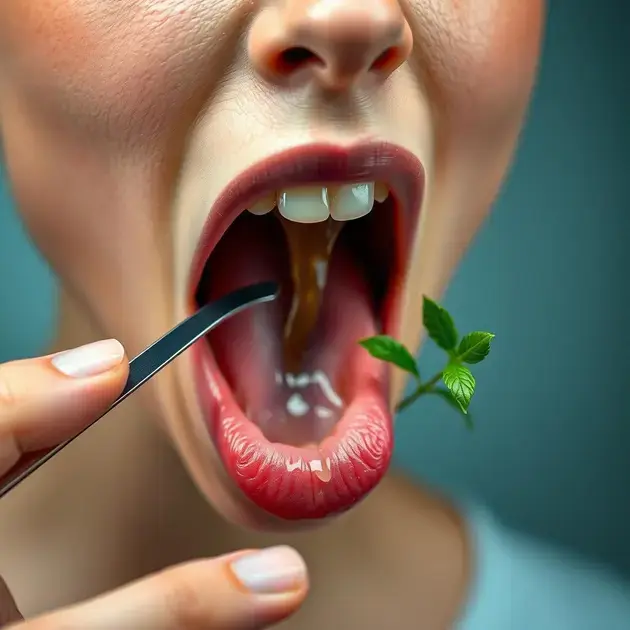Awful halitosis, commonly known as bad breath, can be an embarrassing and often distressing condition for many. Various factors, from poor oral hygiene and certain foods to underlying medical conditions, contribute to this troublesome issue. It’s not just about the social stigma; halitosis can also be a sign of deeper health problems, making understanding its causes, treatments, and prevention vital. Recent studies suggest that advances in microbiome science are promising for more effective management and treatment of halitosis.
Addressing bad breath starts with identifying its root causes. Whether it’s due to dental decay, gum disease, or the result of systemic conditions such as diabetes or kidney disease, appropriate interventions can vary significantly. Treatment strategies range from improved dental hygiene practices to the use of specific therapeutic mouthwashes and even dietary adjustments. Moreover, regular dental check-ups and professional cleanings play a crucial role in both treatment and prevention, ensuring that individuals maintain optimal oral health and freshness.

Understanding the Roots of Halitosis
Bad breath, also known as halitosis, can have various underlying causes. One common root of halitosis is poor oral hygiene. Failing to brush and floss regularly allows bacteria to accumulate in the mouth, leading to unpleasant odors. Additionally, certain foods like garlic and onions can contribute to bad breath by releasing sulfur compounds when broken down by bacteria in the mouth.
To better understand the roots of halitosis, individuals can use resources like medical websites such as WebMD or the Mayo Clinic. These platforms offer detailed information on the causes of bad breath, allowing individuals to pinpoint the specific factors contributing to their condition and take appropriate action.
Effective Treatment Options for Bad Breath
When it comes to treating bad breath, there are several effective options available. One common treatment is maintaining good oral hygiene practices, such as brushing twice a day, flossing daily, and using mouthwash. These simple steps can help remove food particles and bacteria that cause bad breath.
Another effective treatment for bad breath is staying hydrated. Drinking an adequate amount of water throughout the day helps keep the mouth moist and promotes saliva production, which can wash away odor-causing bacteria.
Individuals looking for treatment options for bad breath can explore resources like Healthline or the American Dental Association website. These platforms provide detailed guides on treating halitosis, offering step-by-step instructions on incorporating effective strategies into daily oral care routines.
Preventive Measures to Combat Awful Halitosis
Preventing bad breath is key to maintaining fresh breath throughout the day. One preventive measure is to avoid foods and drinks known to cause bad breath, such as garlic, onions, and alcohol. Opting for breath-friendly foods like apples or carrots can help freshen breath naturally.
Regular dental check-ups are also essential in preventing halitosis. Dentists can identify any underlying oral health issues that may be contributing to bad breath and provide treatment recommendations. Additionally, using a tongue scraper to clean the surface of the tongue can help remove bacteria and prevent odors.
For individuals seeking preventive measures for bad breath, websites like Colgate or Crest offer valuable insights on oral care routines that can help combat halitosis. By following these recommendations, individuals can proactively address the root causes of bad breath and maintain long-lasting freshness.

Common Causes of Chronic Bad Breath
Chronic bad breath, also known as halitosis, can be caused by various factors that go beyond just inadequate oral hygiene. One common cause is poor dental health, including issues such as gum disease, cavities, or oral infections. These conditions can lead to the buildup of bacteria in the mouth, releasing foul-smelling gases that cause bad breath.
Another common cause of chronic bad breath is dry mouth, which can be a result of certain medications, medical conditions, or simply not drinking enough water. Saliva plays a crucial role in washing away food particles and bacteria in the mouth, so a lack of saliva can contribute to persistent bad breath.
Diet can also play a significant role in causing chronic bad breath. Foods with strong odors, such as garlic and onions, can leave a lingering smell in the mouth even after brushing. Additionally, low-carb diets that lead to ketosis can result in a distinct, unpleasant breath odor.
Other factors that can contribute to chronic bad breath include smoking and tobacco use, which can leave a lasting smell on the breath, as well as underlying medical conditions like respiratory infections, diabetes, or liver disease. Addressing these root causes is essential in effectively managing chronic bad breath.
To combat chronic bad breath, it’s crucial to maintain good oral hygiene, stay hydrated, avoid tobacco products, and address any underlying dental or medical issues. Regular dental check-ups and cleanings can help identify and treat potential causes of halitosis, leading to fresher breath and improved overall oral health.
Innovative Halitosis Remedies You Haven’t Tried Yet
While traditional methods like mouthwash and chewing gum can provide temporary relief from bad breath, there are some innovative remedies worth exploring. One lesser-known remedy is oil pulling, a practice that involves swishing coconut or sesame oil in the mouth to reduce bacteria and freshen breath.
Another unique remedy is probiotic supplements, which can help restore a healthy balance of bacteria in the mouth and gut, potentially improving bad breath. Certain essential oils, such as peppermint or tea tree oil, have antibacterial properties that can combat the root cause of halitosis.
For those looking for a more natural approach, herbal remedies like parsley, mint, or fennel seeds can act as natural breath fresheners and digestive aids. Activated charcoal supplements or toothpaste are also gaining popularity for their ability to absorb toxins and odors in the mouth.
One intriguing remedy that many haven’t tried yet is tongue scraping, a practice rooted in ancient Ayurvedic medicine. By gently scraping the tongue’s surface, you can remove bacteria and debris that contribute to bad breath, leading to a cleaner and fresher mouth.
Exploring these innovative halitosis remedies can provide new insights into managing chronic bad breath and achieving long-lasting oral freshness. Incorporating these remedies into your daily routine alongside traditional approaches can help address the underlying causes of halitosis more effectively.
Simple Habits to Keep Bad Breath at Bay
Maintaining fresh breath doesn’t have to be complicated. By adopting some simple habits, you can keep bad breath at bay and enjoy a confident smile throughout the day. One essential habit is to brush your teeth at least twice a day, paying special attention to your tongue, where bacteria can accumulate.
Flossing daily is another crucial habit that helps remove food particles and plaque from between teeth, preventing bacteria buildup and potential bad breath. Using a mouthwash or oral rinse can provide an extra layer of protection against bacteria and leave your mouth feeling refreshed.
Staying hydrated by drinking plenty of water throughout the day helps keep your mouth moist and washes away food debris and bacteria that can cause bad breath. Chewing sugar-free gum or mints can also stimulate saliva production and mask temporary odors after meals.
Avoiding tobacco products and limiting odorous foods can significantly impact your breath freshness. Incorporating more fruits and vegetables into your diet not only boosts your overall health but can also help maintain a cleaner mouth and fresher breath.
Finally, scheduling regular dental exams and cleanings is key to preventing and addressing any underlying issues that may contribute to bad breath. By practicing these simple habits consistently, you can enjoy long-lasting oral freshness and feel more confident in your breath throughout the day.
Conclusion
In conclusion, chronic bad breath, or halitosis, can stem from various factors beyond poor oral hygiene. Issues like gum disease, cavities, and dry mouth can lead to the accumulation of bacteria in the mouth, resulting in unpleasant odors. Dietary choices, such as consuming foods with strong odors or following low-carb diets, can also contribute to persistent bad breath. Additionally, habits like smoking, underlying medical conditions, and lack of adequate saliva production play a role in halitosis.
Exploring innovative remedies like oil pulling, probiotic supplements, and tongue scraping can provide new avenues for managing chronic bad breath. These remedies, alongside traditional methods like regular dental check-ups and cleanings, offer a holistic approach to tackling halitosis. Incorporating herbal remedies, essential oils, and activated charcoal into your oral care routine can help combat the root causes of bad breath effectively.
By cultivating simple habits such as brushing and flossing regularly, staying hydrated, and avoiding tobacco products and odorous foods, you can maintain fresh breath and oral health. Prioritizing these practices not only prevents bad breath but also boosts your overall confidence and well-being. Remember, a combination of preventive measures, innovative remedies, and traditional oral care techniques is key to achieving long-lasting oral freshness and a bright smile.
